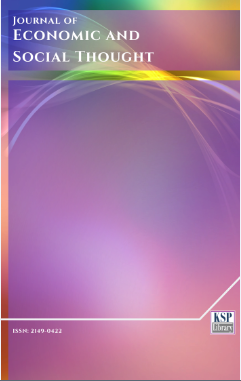South Sudan: The dilemma of a protracted social conflict
Abstract
Abstract. This study examined the conflict in South Sudan, which started in December 2013 due to political dissatisfaction between President Salva Kiir and his then Vice President Riek Machar. When South Sudan got independence in 2011 through a referendum where more-than 98 percent of the population supported secession from Sudan, the country became a case study for potential secessions in Africa. However, the euphoria of independence quickly evaporated, and immediately replaced by violent conflict. Thus, the study explored the major causes of the conflict and concluded that political discontent resulting from power struggle among the elites fuelled the conflict. Furthermore, the study argues that citing ethnicity as the fundamental cause of the conflict is misleading and ill-conceived. Rather than being the catalyst of the conflict, the present conflict in South Sudan has rekindled ethnic identities and ideologies to a record height. The new wave of ethnic sentiment in South Sudan is as a result of irrational quest for political power and control among the top echelons in the country. Although ethnicity is not considered as the main cause of the conflict, however, given that the present situation has invigorated ethnic identities and sentiments in the country, the study concludes that any viable solution to the conflict must give incentives to fair ethnic and inter-ethnic representation and coalitions.
Keywords. South Sudan, Power struggle, Ethnicity, Violence conflict, Peace-building.
JEL. A13, A14, A30.
Keywords
References
Aljazeera, (2014). South Sudan President Fires Cabinet, Accessed 22 May 2018. [Retrieved from].
Azar, E. (1990). The Management of Protracted Social Conflict: Theory and Cases, England: Dartmouth Publishing Company.
Dessalegn, G.A. (2017). The cause and consequence of conflict in South Sudan, International Journal of Political Science and Development, 5(1), 15-21. doi. 10.14662/IJPSD2016.063
De Waal, A. (2014). Visualizing South Sudan: The Culprit: The Army, World Peace Foundation, Accessed 12 May, 2018. [Retrieved from].
International Crisis Group. (2014). South Sudan: A civil war by any other name, Africa Report, No.217, 10th April.
Lederach, J.P. (2005). The Moral Imagination: The Art and Soul of Building Peace. New York: Oxford University Press.
Koos, C., & Gutschke, T. (2014). South Sudan’s newest war: When two old men divide a nation, German Institute of Global and Area Studies (GIGA), Focus No.2.
Lunn, J. (2016). War and peace in South Sudan: March 2016 update briefing paper, House of Commons Library, No.7552. Accessed 13 May 2018. [Retrieved from].
Maasho, A. (2018). South Sudan's president, rebel leader sign peace deal, Reuters, 12 September. Accessed 28 July 2018. [Retrieved from].
Maslow, A. (1943). A theory of human motivation, Psychological Review, 50(4), 370-396. doi. 10.1037/h0054346
Mbah, F. (2018). What next for South Sudan's peace agreement? Aljazeera News, 28 June. Accessed 28 July 2018. [Retrieved from].
Ogbonna, C. (2017). Targeted or restrictive: Impact of U.S. and EU sanctions on education and healthcare of Zimbabweans, African Research Review, 11(3), 31-41. doi. 10.4314/afrrev.v11i3.4
Ottaway, M. & El-Sadany, M. (2012). Sudan: From Conflict to Conflict, Washington, D.C.: Carnegie Endowment for International Peace.
Ramsbotham, O. (2005). The analysis of protracted social conflict: A tribute to Edward Azar, Review of International Studies, 31(1), 109-126. doi. 10.1017/S0260210505006327
Ramsbotham, O., Miall, H., & Woodhouse, T. (2011). Contemporary Conflict Resolution, Cambridge: Polity.
Wel, P. (2013). Oil dependence is South Sudan’s boon – and bane, The National, 10 September. Accessed 13/05/2018. [Retrieved from].
DOI: http://dx.doi.org/10.1453/jest.v5i3.1755
Refbacks
- There are currently no refbacks.
Journal of Economic and Social Thought - J. Econ. Soc. Thoug. - JEST - www.kspjournals.org
ISSN: 2149-0422
Editor: jest@ksplibrary.org Secretarial: secretarial@ksplibrary.org Istanbul - Turkey.
Copyright © KSP Library




